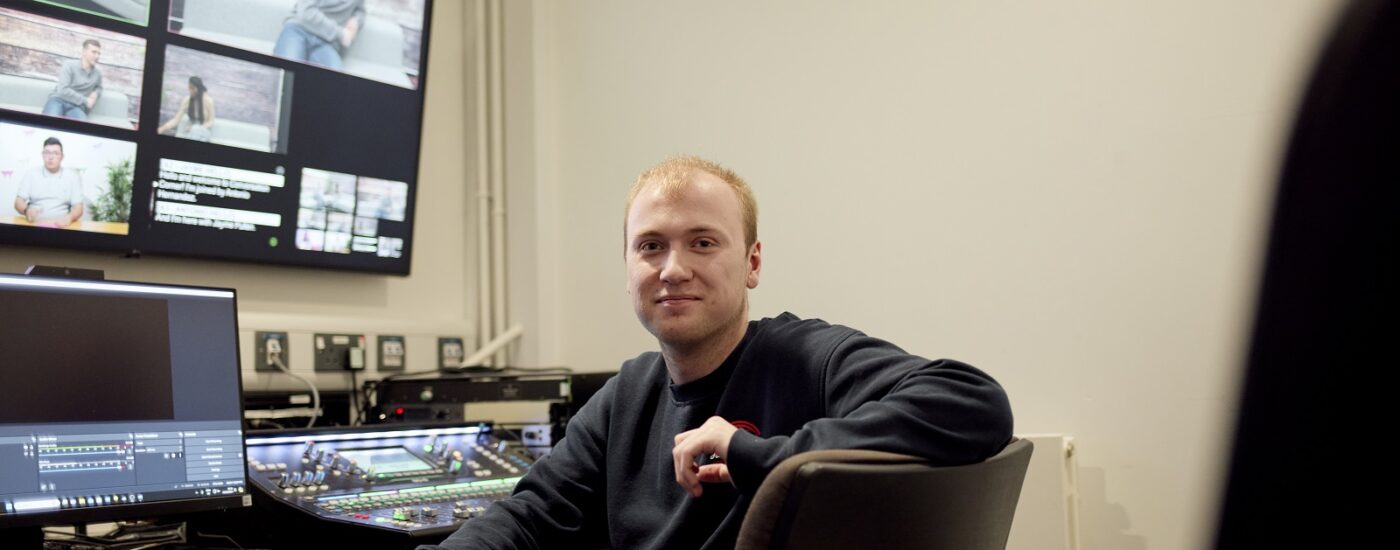Lecturer in Screen Studies
Film and Screen Studies BA (Hons)

Film and Screen Studies BA (Hons)
- Home
- Courses by subject
- Film and Screen Studies BA (Hons)
Key Facts
-
UCAS Code
BA: P300
BA with Foundation: P304 -
Level
UndergraduateUG BA (Hons)
-
Duration
Full Time: 3 years
Full Time Foundation: 4 years
Part Time: 4 - 5 years -
Starting
September
-
BCC at A-Level or,
DMM at BTEC -
Full Time: £9,535
Part Time: £1,585 per 20 credit module
Integrated Foundation Year: £9,535 -
Full Time: £15,700
Integrated Foundation Year: £15,700 -
Waterside
Updated 28/03/2025
Updated 28/03/2025
Get in touch
For questions regarding study and admissions please contact us:
UK STUDENTS ENQUIRIES
study@northampton.ac.uk
0300 303 2772
INTERNATIONAL STUDENTS ENQUIRIES
Please note that BA (Hons) Film and Screen Studies has closed recruitment for 2025. You may wish to considered one of the following programmes instead:
The University of Northampton’s BA Film and Screen Studies degree is an exciting and forward-facing programme of study that gives you the opportunity to explore both the art and the industry of modern screen media. From Superhero Cinema to South Korean Television, Indie videogames to Disney fandom, British teen dramas to cult science fiction, the diversity that at the centre of the course means you get the chance to investigate the narrative, artistic, cultural, economic and political implications of a range of both nationally and internationally significant screen texts.
Through exciting interactive seminars, discussion based workshops and free screenings at the local cinema, the Northampton Filmhouse, you’ll study modules that combine world class staff expertise with a contemporary focused and media industry informed curriculum. Learning about processes such as scriptwriting, media curation and exhibition, film festivals and conventions, Film Studies degree will give you the skills you need to understand that screen media not just entertainment: it’s the primary medium for storytelling, and for learning more about the world we live in and the people who live in it with us.
Highlights
- Covers a diverse range of film and screen media – from traditional Hollywood cinema to Netflix and Disney+ and the latest cutting-edge video games.
- Engage with vital contemporary issues concerning diversity and social justice movements
- One of the only film studies degree programmes in the UK to teach students in a working independent cinema.
- Opportunity to visit free UK sites and trips, and partake in masterclasses with industry practitioners.
- Taught by staff with internationally recognised expertise
- Guaranteed paid internship with the Northampton Employment Promise.
- HP Laptop and software included with this Film Studies course. Terms and Conditions apply
Entry Requirements
A typical offer for Film and Screen Studies would be:
- BCC at A-Level or,
- DMM at BTEC/Cambridge Technical or,
- Pass (C and above) at T Level
-
We welcome international applications and applications from students with a range of non-traditional educational or professional qualifications, and also applications from students with a mix of A levels and BTEC/Cambridge Technical qualifications.
For more information on how to make an application, please visit our How to Apply page.
If you are an International student and would like information on making an application, please see our How to Apply page.
-
Admission to this foundation programme is normally:
- DEE at A-Level or,
- MPP at BTEC or,
- Pass (D or E) at T Level
However, we would also like to hear from you if you have professional or industry experience instead, a range of other qualifications or self-developed subject knowledge that relates to the programme you wish to study.
-
All International and EU students applying for a course with us must meet the following minimum English language requirements:
- IELTS 6.0 (or equivalent) with a minimum of 5.5 in all bands for study at undergraduate level.
For information regarding English language requirements at the University, please see our IELTS page.
Worried about student finance?
Get all the info you need ahead of time, before you can apply for funding in Spring on our fees and funding pages.
Course Content
-
Focusing on the study of the moving image, the Film and Screen Studies BA programme enables students to analyse how screen media creates meanings through particular forms, techniques, and styles; how industrial organization affects the way films are produced and received; and how the social context in which they are made and consumed influence the way we understand and make meaning.
The curriculum covers a diverse range of media formats, with emphasis upon popular and contemporary screen media (film, television, streaming services, mobile and digital screen media.)
Year 1
The Film Studies degree is structured on a three-stage progressive model. The first year will introduce students to the history and development of screen media, as well as how society and scholars have sought to understand the content, audiences, and industry of popular media; specific modules include investigating the figure of the superhero, animation and representation, stardom, transmedia, Hollywood film and the auteur.
Modules you might study include:
- From King Kong to The Godfather: Introduction to Hollywood Film (20 credits)
- Marketing Stardom: Celebrity on Screen (20 credits)
- Truth, Justice and Adaptation: Superheroes on Screen (20 credits)
- Beyond the Disney Princess: Representation and Animation (20 credits)
- Youth on Screen (20 credits)
- Studying the Modern Auteur (20 credits)
- A History of a Thousand Faces: Hair, Makeup and Prosthetics (20 credits)
Year 2
In stage two of this film degree, you will build on the skills gained in stage one; more optionality allows focus on specific areas of screen media, developing your knowledge of how film and screen media operate in the field of popular culture and its various industrial contexts. Typical modules include Fan Cultures, scriptwriting, European Cinemas, sci-fi and fantasy genres, and critical and cultural screen theory.
Modules you might study include:
- Genre: Fantasy, Robots and Monsters (20 credits)
- Fan Cultures (research module) (20 credits)
- Screen and the Self (20 credits)
- Global Cinema: Europe (20 credits)
- Working in Screen Media (20 credits)
- Gender, Race and Sexuality in Contemporary Media (20 credits)
- Scriptwriting (20 credits)
- It’s Alive!, It’s Alive!: Studying Contemporary Character Design (20 credits)
Year 3
In stage three, building on the work done over prior years, module options will provide the opportunity for students to pursue specialised interests, such as Cult Media, East Asian Cinemas, and Videogames. You will also have space to explore your specific passions via a written dissertation.
Modules you might study include:
- Global Cinemas: East Asia (20 credits)
- An Offer You Can’t Refuse? Contemporary Crime on Screen (20 credits)
- Cult Media (20 credits)
- Video Games (20 credits)
- Hollywood and Beyond (20 credits)
- Long Dissertation (Can involve Advanced Scriptwriting option) (40 credits)
Please note the modules shown here relate to the academic year 24/25. The modules relating to the academic year 25/26 will be available from June 2025.
-
-
Writing the Media (20 Credits)
Module code: MED1085Status: CompulsoryThe purpose of this module is to introduce students to key debates around creative thinking and production and examine writing about media within the context of production and reception.
-
From King Kong to the Godfather: Introduction to Hollywood Film (20 Credits)
Module code: MED1090Status: CompulsoryThe purpose of this module is to provide students with a survey of key examples from the early and classical periods of Hollywood Filmmaking. Students will explore how key films, offer perspectives on the key thematic and representational concerns of US culture.
-
Truth, Justice and Adaptation: Superheroes on Screen (20 Credits)
Module code: MED1092Status: CompulsoryThe purpose of this module is to introduce students to ideas and concerns that are relevant to contemporary screen media. The module will use the superhero narrative, a popular contemporary form, to look at critical debates surrounding scholarly topics including adaptation, representation, transnationalism, cultural materialism, ideology and screen theory.
-
Studying the Modern Auteur (20 Credits)
Module code: MED1093Status: CompulsoryThis module studies and interrogates styles and conventions of filmmaking via a range of directors and films across various genres, national movements, and eras, thereby providing students with an introduction to the study of the moving image and the vocabulary of film studies from both technical and critical perspectives.
-
Beyond the Disney Princess: Representation and Animation (20 Credits)
Module code: MED1094Status: CompulsoryThe purpose of this module is to critically introduce students to the diverse range of character representations beyond, and which even challenge, the infamous fairy tale princess in Disney live-action and animated film, tv and video game.
-
Youth on Screen (20 Credits)
Module code: MED1095Status: CompulsoryThis module encourages students to chart the evolution of screen stories for and about the young: considering different approaches and themes from the lighthearted, comic and celebratory to the often darker, more brutal depictions of the challenges of adolescence.
-
Writing the Media (20 Credits)
-
-
Genre: Fantasy, Robots and Monsters (20 Credits)
Module code: MED2120Status: DesignateThe purpose of this module is to consider the concept and importance of one of the most significant structuring principles for screen media: genre. This will be achieved through the close study of three specific popular instances: Fantasy, Science Fiction and Horror.
-
Fan Cultures (20 Credits)
Module code: MED2121Status: DesignateIn this module, students will be encouraged to use their personal experiences to critically consider the media franchises with which they engage and relate these to theoretical debates in fan studies, with emphasis upon ideas of identity, and the potential power of fandom.
-
Screen Theory (20 Credits)
Module code: MED2122Status: DesignateStudents will examine key developments in critical and cultural theory in terms of how these have been/can be applied to the analysis of moving image media. The historical trajectory of these theories is considered, as well as how these conceptual frameworks inform contemporary scholarship.
-
European Screens (20 Credits)
Module code: MED2123Status: DesignateThis module provides the historical, cultural and industrial contexts that will allow students to view, discuss and interpret film and other screen media from a number of European movements and national cultures.
-
Researching for Screen Media (20 Credits)
Module code: MED2124Status: CompulsoryThe purpose of this module is to familiarise students with a range of research methods and approaches in both professional and academic environments, encouraging development and employability. It also prepares students for the dissertation at Level 6.
-
Gender, Race, Sexuality: Representing Identity in Contemporary Screen Media (20 Credits)
Module code: MED2125Status: DesignateThis module will introduce students to a diverse range of contemporary identity theory and encourage them to consider how these ideas might be applied to a range of screen media including (but not limited to) film, television, music video and videogames.
-
Scriptwriting for Film (20 Credits)
Module code: MED2126Status: DesignateThe purpose of this module is for students to develop an understanding of the working practices of writing scripts for film, covering aspects of short form and feature writing, via the practical development of a series of scripts and related materials following industry practice and to a professional standard.
-
Genre: Fantasy, Robots and Monsters (20 Credits)
-
-
Global Screens (20 Credits)
Module code: MED3060Status: DesignateExpanding on the European cinemas module in both scope and sophistication, this module provides historical, cultural and industrial contexts that will allow students to view, discuss and interpret screen media from a number of International cinemas and national cultures as well as the implications of transnational productions.
-
Cult Media (20 Credits)
Module code: MED3062Status: DesignateThe purpose of this module is to enable students to critically examine and evaluate conventions, structures and cycles of `cult? media and how such media relates to wider social and cultural concerns and contexts.
-
Hollywood and Beyond (20 Credits)
Module code: MED3063Status: DesignateBuilding on the level 4 Introduction to Hollywood module, in this module students will extend their understanding of Hollywood filmmaking from the mid-1970s to present day. Through close analysis and specific case studies, students will critically examine how Hollywood reflects, comments upon, and actively helps shape our understanding of contemporary social and cultural realities.
-
Contemporary Crime on Screen (20 Credits)
Module code: MED3064Status: DesignateThis module encourages students to investigate screen depictions of crime across a range of genres including film, television drama, real-life crime and documentary, and to consider the significance of the social, historical and psychological contexts in which it has evolved.
-
Advanced Scriptwriting (20 Credits)
Module code: MED3065Status: DesignateThis module develops student's screenwriting abilities to produce work to a rigorous professional standard, through analysis and practice of the processes of screenwriting, pitching, commissioning and script editing within the television and streaming industry.
-
Media, Film & Screen Studies Dissertation (40 Credits)
Module code: MED4036Status: CompulsoryThe purpose of the dissertation module is to allow students to develop, at length, a particular interest from the area of Film and Screen studies, and to apply the research, evaluative, analytical and organisational techniques learnt during their degree to a major research project.
-
Global Screens (20 Credits)
-
At the University of Northampton, everything we do, from funded trips to paid internships, is to give you everything you need to make a difference when you leave.
If you join this full time Film and Screen Studies degree at the University of Northampton, you will receive a laptop when your course begins*. The laptops are built to a bespoke custom specification ideal for use in the seminar room, collaborative group work or studying at home.
Whatever your ambitions, we’re here to help you to achieve them. We’ll support you to identify the skills you’re learning during your film studies course, find your strengths and secure practical experience so that when it comes to applying for jobs or further study you’ll feel confident in standing out from the crowd. We’ve created the Northampton Employment Promise because we are so confident that if you focus on your studies and complete one of our awards you’ll be highly employable by the time you graduate. Putting you in a great position to secure employment or continue your studies.
To check out the full list of perks, visit our Student Perks page or dedicated International Perks page.
*UK fee payers only (see Terms and Conditions for further details).
-
The Integrated Foundation Year (IFY) offers a new and exciting route into studying for a film studies degree, attracting ambitious and driven students who are willing to learn and advance.
If you have non-standard qualifications or do not quite meet the admissions requirements we can offer you a fantastic opportunity to study a four year programme which includes an Integrated Foundation Year. The Integrated Foundation Year will help you develop the theoretical/practical and academic skills you need, in order to successfully progress to the full award.
Our four-year courses will enable you to successfully follow the degree pathway of your choice while gaining essential study skills. The foundation year of your chosen degree will be studied on a full-time basis and is aimed at supporting the transition to higher education. Years two, three and four are then studied as a standard degree programme.
-
How will I be taught on Film and Screen Studies BA?
We aim to bring out the best in all our undergraduates and we recognise that employers are increasingly demanding that graduates are well equipped with a range of transferable skills. You will be taught via a variety of lectures, seminars, and workshops, augmented by online blending learning content.
How will I be assessed on the Film and Screen Studies degree?
You will be assessed in a variety of ways; alongside more traditional assessment methods such as essays, presentations, and projects, you will also engage in innovative technology-supported assessment, such as video essays and podcasts, via the University virtual learning environment. Throughout your film studies degree, we will offer you the best support available to allow you to get the most from your independent and team-based learning.
Student Story
"My course and time at Northampton really set me up for my career in Film and TV . . ."
Eleanor Todd
Fees and Funding
2025/26 Tuition Fees
- UK – Full Time: £9,535
- UK – Part Time: £1,585 per 20 credit module
- UK – Integrated Foundation Year: £9,535
- International – Full Time: £15,700
- International – Integrated Foundation Year: £15,700
Fees quoted relate to study in the Academic Year 2025/26 only and may be subject to inflationary increases in future years. UON will adjust UK fees annually in line with Government Policy.
-
For information on the scholarships available to you, please see our scholarships page.
For more information about possible funding options, please visit our Fees and Funding pages.
-
Fees quoted relate to study in the Academic Year 24/25 only and may be subject to inflationary increases in future years.
- UK – Full Time: £9,250
- UK – Part Time: £1,540 per 20 credit module
- UK – Integrated Foundation Year: £9,250
- International – Full Time: £15,200
- International – Integrated Foundation Year: £15,200
Staff
Careers and Employability
Students take Film and Screen studies for a great variety of reasons; whether you wish to pursue a career in the creative industries, or simply explore your passion for screen media, the course will provide you with skills which open up a range of career opportunities. The most common sectors you may find work in are the media, creative, cultural and heritage industries. As well as traditional destinations in the film and broadcasting industries, you may also be interested in other media sectors such as publishing and research.
Recent graduates from our film studies degree have secured jobs with Disney, The BBC, and Channel 4, while others have formed their own independent media companies, have pursued careers in web design, publishing, teaching, or gone on to further academic study.

Related Courses

Creative Film, Television and Digital Media Production BA (Hons)
Explore media production through masterclasses with industry practitioners and benefit from broadcast recording equipment and editing...

Hair, Make-Up and Prosthetics for Stage and Screen BA (Hons)
Designed to cultivate a varied practical skills-set to prepare you for a career within the make-up...




